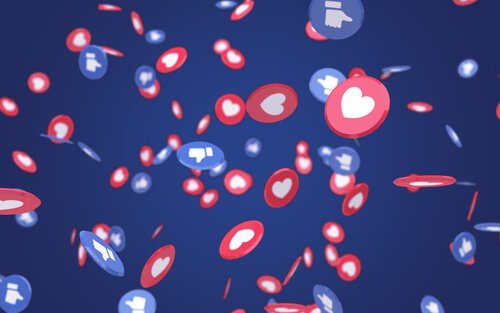Using Facebook Decreases Emotional Well-Being

The project that began as a small page to allow university students to get in touch with their schoolmates is now a fundamental part of most people’s daily lives. It’s a way to contact old friends and grow a business. We’re obviously talking about Facebook.
However, this seemingly positive social network does have a downside. A study conducted in 2015 by Morten Tromholt, a scientist at the University of Copenhagen, and published in the journal Cyberpsychology, Behavior, and Social Networking, states that an excessive use of Facebook decreases emotional well-being.
Despite this finding, Facebook continues to occupy a central space in our daily lives. Should we be worried about using Facebook or is this a false alarm? Science suggests that we must find better ways to use it. Let’s delve deeper into this.
How Facebook decreases emotional well-being
An excessive use of Facebook correlates with higher levels of emotional distress. Let’s look at how this social network influences us.
1- It makes us compare ourselves to others
If you use Facebook often, you know that most people don’t upload pics of regular, everyday things. People use it to showcase the most incredible and extraordinary things in their lives. It’s like watching a happy movie about them. They only show things that are prized by society and the “likes” are applause.

Every time you open Facebook, you see friends traveling the world, having perfect romantic relationships, and eating gourmet food. Meanwhile, you’re sitting at home gazing with envy at what they have.
One of the most common things people do in these scenarios is compare themselves to everyone else. The problem is that this comparison isn’t realistic. On Facebook, we only see the best moments of people’s lives. So, if you find yourself thinking that your life isn’t good enough, you may be using social media too much.
2- It makes you apathetic
One of the most studied phenomena in psychology is learned helplessness. This is the inability to leave an undesirable situation even if you want to.
Some studies reveal that Facebook decreases emotional well-being by showing people a lot of tragic events they can’t change. For example, on Facebook, there are news about crimes, natural disasters, and many other personal hardships. Hence, it can make you feel less motivated and enthusiastic about life.
3- It saturates you with information
As if the two previous points weren’t enough, scientists studied a new variable in recent years: the effects of too much information on the brain.

Our minds evolved in an environment where information was scarce. Therefore, the brain can’t deal with the large amounts of data we now have access to. Facebook decreases emotional well-being by bombarding you with unconnected ideas and information. This produces apathy and lethargy.
In addition, this excess information can increase anxiety and stress levels in the frequent users of this social network. According to Behavioral Brain Research magazine, the continuous use of Facebook can reduce the brain’s gray matter.
As you can see, using Facebook excessively has consequences. You can avoid these consequences by using this social network moderately. In this regard, if you notice that your attention span decreases or that you’re uncomfortable when you visit Facebook, reducing the time you spent on the social network may be good for you.
This text is provided for informational purposes only and does not replace consultation with a professional. If in doubt, consult your specialist.








